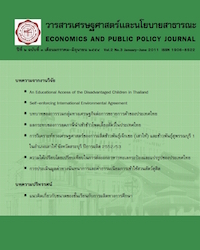บทบาทของการรวมกลุ่มทางเศรษฐกิจต่อการค้าของประเทศไทย
Main Article Content
บทคัดย่อ
The Role of Economic Integration on Thailand's Trade Expansion
Currently, several countries including Thailand form a variety of economic integration, where those countries consider mutual benefits from trade and investment from enhancing free trade. However, economic integration theoretically causes two effects: trade creation and trade diversion, and these two aspects have not much been studied previously. This research thus aims to study the impact of economic integration, particularly AFTA, on Thailand to the aspects of trade creation and trade diversion. Factors affecting Thailand's exports to other member countries in the three groups of economic integration: AFTA, APEC, and ACFTA are also studied. The analysis in this research is based on Gravity Model, using the cross-sectional secondary data in 2008 of such the three groups. The results show that the net effect of economic integration in the case of AFTA is to create trade creation. In addition, the study finds that the GDP per capita and the number of population of the importing countries are factors that affect Thailandqs exports to other member countries in APEC and in ACFTA. The distance between countries is the factor that affects Thailandqs exports only for APEC. The exchange rate, however, has no statistically significant impact on Thailandqs exports in both APEC and ACFTA. For AFTA, there exist some limitations in eliminating the problem of autocorrelation due to insufficient number of observations.
Article Details
สงวนลิขสิทธิ์ © 2553 คณะเศรษฐศาสตร์ มหาวิทยาลัยศรีนครินทรวิโรฒ
คณะเศรษฐศาสตร์ มหาวิทยาลัยศรีนครินทรวิโรฒ จัดพิมพ์วารสารเศรษฐศาสตร์และนโยบายสาธารณะ เพื่อเผยแพร่บทความวิชาการทางเศรษฐศาสตร์ นโยบายสารธารณะ และสาขาอื่นๆที่เกี่ยวข้อง ทัศนะและข้อคิดเห็นใดๆ ที่ปรากฏในวารสารเป็นความคิดเห็นส่วนตัวของผู้เขียน โดยบทความที่ได้รับการตอบรับจะถือเป็นลิขสิทธิ์ของคณะเศรษฐศาสตร์ มหาวิทยาลัยศรีนครินทรวิโรฒ
บรรณาธิการ อาจารย์ ดร.พลพัธน์ โคตรจรัส


